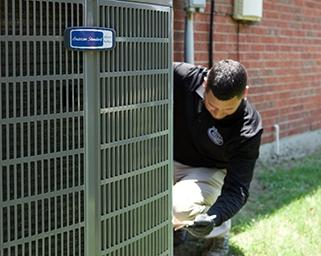How To Choose the Right Heat Pump System: Q and A
Get some expert tips on how to get the best heat pump system for your home.

By Anne Fonda
So, you’ve decided to heat and cool your home with an electric heat pump system. Congratulations! It’s one of the most energy-efficient decisions you can make that can help decrease your energy bills and decrease your carbon footprint if you’re replacing a gas furnace with a heat pump.
You may have never shopped for a split system heat pump, or it’s been more than a decade. Your options have changed. Today’s high-efficiency heat pumps have advanced technology to effectively heat and cool your home.
But where to start? By doing your homework, of course. Just like you scour car review websites like Edmunds or Kelly Blue Book when you’re car shopping, you’re smart to do your research on air source heat pump systems and the various considerations.
We recently sat down with Mark Woodruff, Senior Product Manager, Ducted Outdoor, who has 25 years of experience in the HVAC industry, to get answers to the most common questions about a heat pump system purchase.
Here’s how our conversation went.
What size heat pump do I need?
“The only way to know for sure is to have a load calculation performed on your home, which is a process usually done by an HVAC installer. The load calculation will take into account your home’s construction, the amount of insulation that you have, window efficiency (for example, single pane windows vs double pane), square footage, and your local weather to figure out what size system you need.”
“Beware of dealers who don’t perform load calculations and rely either on very basic rules of thumb or just want to replace your system with whatever you currently have. Those are usually signs that you should find a better dealer.”
- Mark Woodruff, Senior Product Manager, Ducted Outdoor

What’s the big difference between a variable-speed heat pump and a two-stage or single-stage heat pump? And what’s this I hear about a multi-stage heat pump?
“The number of speeds or stages typically translates to energy efficiency and better comfort… so the more variability or number of stages, the more efficient the equipment will operate and the better temperature and humidity control the system can deliver to your home.
Single-stage systems are either ‘On’ or ‘Off’. That means they either run 100% full power or they are off. Two-stage systems are more efficient than their single-stage counterparts, and will have a high speed and a low speed (usually 100% and 70% respectively), or be off.
Variable speed heat pumps are the most efficient as they can vary their output and draw the least amount of power required to maintain your desired temperature in the home.
Multi-speed systems are a rather new design and straddle the gap between traditional two-stage systems and variable speed. They offer better efficiency than single or two-stage systems but are simpler than variable speed systems and are available at a lower price.”
Learn more about the differences between the various systems.

Is a variable-speed system really worth the extra cost?
“Variable speed systems are quieter (both inside and outside the house), more efficient, offer better temperature and humidity control, and have the greatest onboard diagnostics data to monitor system performance and reliability. It is up to the homeowner to decide whether those features are important to them.”
What SEER2 should I look for?
“SEER2 measures efficiency in the cooling mode (i.e. in the summertime). This may be more important in hot climates that have long, hot, and humid summers vs a region with short and mild summer temperatures. Our advice is to weigh the pros and cons of the system as a whole.
Lower SEER2 systems are generally less expensive to buy, however, they use more power to operate. That lower purchase price may be worth it if you do not plan to stay in your home for very long and are not as worried about the long-term cost benefits of a more efficient system,” Woodruff added.
To learn more, read our blog What Is a Good SEER2 Rating?
What HSPF2 do I need?
“HSPF2 measures the heat pump efficiency in the heating mode (i.e., in the wintertime). This may be more important to customers in cooler areas where longer and colder winters are more common, and therefore a higher HSPF2 is a benefit.”
Do I still need a furnace?
“Having a furnace as a part of your HVAC system is usually a matter of choice/preference. Heat pump technology has come a long way, and in the vast majority of the country, heat pumps can keep your home warm in the winter. That can change, however, if you live in a very cold region and have an older and less insulated home that may need more heat to stay warm.”
“Our advice is to install a heat pump even when installing a gas furnace. This is called a hybrid heat system, and just like a hybrid car or truck, it will operate on electricity most of the time and switch to the gas furnace whenever the temperatures get cold enough that it is needed.”
– Mark Woodruff, Senior Product Manager, Ducted Outdoors
“This hybrid operation is very efficient, and the cost of this type of system is not significantly different from a non-hybrid system.”
What air handler should I get?
“This can be a complicated answer best left to a qualified American Standard dealer who can walk you through the process of choosing the right air handler for your particular home.”
If you’re replacing the indoor furnace with an air handler, the 120V Modular Variable Speed Air Handler may be an option. It offers a plug-and-play solution that doesn’t require any electrical upgrades or retrofitting.
Are all HVAC companies qualified to install my heat pump system?
“All American Standard dealers are, at least. I can’t speak about the rest.”
Learn more about how to find the best HVAC company near you.
Q: Why get an American Standard heat pump system?
American Standard is routinely ranked as one of the top HVAC brands and offers reliable ducted air source heat pumps. As Woodruff says, “There is no reason not to. In 100% of the situations where you are replacing your HVAC system, you can apply a heat pump, even if you are installing a gas furnace as part of the system.
Rebates & incentives will often cover any differences in equipment purchase price, and at the same time, you’re going to save energy and be more environmentally friendly. Finally, if you are going to buy a heat pump system, you may as well buy from the company that has been doing it the longest, and we have been building heat pumps since 1955 when we launched the first commercially viable heat pumps in the industry.”
What’s the biggest mistake homeowners make when getting a new heat pump system?
“Probably this would be not knowing that there are a lot of heat pump rebates and heat pump tax credits available (Until December 31, 2025) that often will let a homeowner install a higher efficiency system for little to no extra cost compared to a minimum efficiency system.”
And so, homeowners most concerned about heat pump cost install a basic system, not knowing that for a very similar price, after incentives, they could have gotten a more efficient system that would save them money on their utility bills every month.”
Last question. What system do you have installed at your own home, and would you recommend it to others?
“I have one of our new 20 SEER2 Link Variable Speed heat pump systems, and I absolutely do recommend it to all of my neighbors. The only thing I would change if it were an option is that I would have installed a hybrid heating system if natural gas were available in my neighborhood. “
The AccuComfort™ Variable Speed Platinum 20 Heat Pump is American Standard’s most energy-efficient heat pump and is currently our best heat pump for heating. We expect to have a cold climate heat pump to offer soon.
Learn more about heat pumps.
Anne Fonda
Content Writer, Trane Technologies
A Content Writer with Trane Technologies, Anne Fonda researches topics and writes for Trane® and associated residential HVAC brands. She works in collaboration with Trane Technologies subject matter experts, offering easy-to-understand, informative content on complex topics. Her goal is to help consumers make informed decisions on the products and services they need.
She has written for HVAC and other service provider websites for over 16 years. Before transitioning to web content writing, Anne had a 14-year stint as an award-winning journalist. She graduated cum laude from the University of Missouri-Columbia School of Journalism.
When she’s not working, Anne enjoys playing word games, reading, gardening, spending time with family, and visiting gardens and museums.
Expert review by Mark Woodruff, Senior Product Manager, Ducted Outdoor



